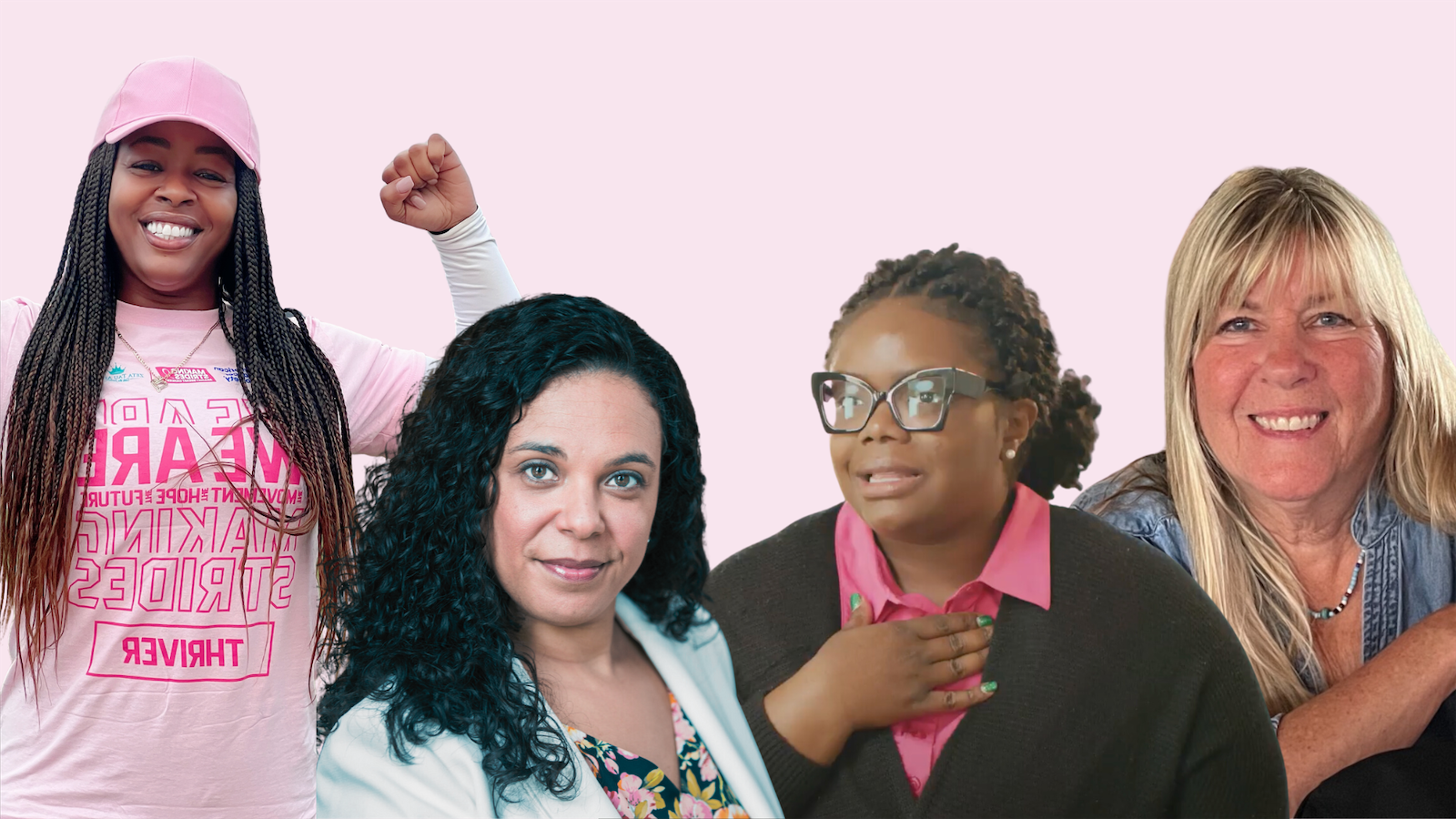In Their Shoes: Breast Cancer Edition
Personal stories matter.
They mean a lot to patients, caregivers, and loved ones, as they can bring comfort to those feeling alone in their breast cancer journey. We’re excited to kick off a new blog series called In Their Shoes: Breast Cancer Edition! Each week, we’ll share real stories from amazing people living with breast cancer.
We hope these experiences help you feel connected and supported. Stay tuned for heartfelt stories that will remind us that no matter what we’re going through, we’re not alone!
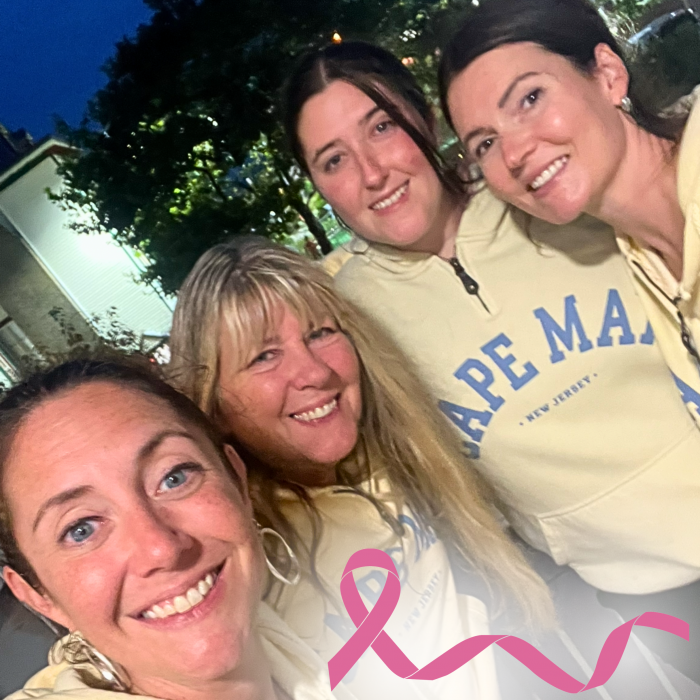
I’m Denise McCrossin, and this is my story.
I had everything ahead of me in the mid-90s. I was a mom of four who loved traveling, playing tennis and racketball, and hiking. Then, in 1998, I was hit with the news that I had breast cancer.
At the time, I was terrified I would die. Then, after what I call my initial “pity party” at hearing I had cancer, I shifted my attitude and went into treatment with a more hopeful attitude. Part of my treatment at the time involved numerous scans, a lumpectomy, the removal of nodes, and, eventually, a mastectomy.
Although treatment wasn’t easy, I tried to keep my life and the lives of my family as normal as possible. I even volunteered for an organization called “Reach To Recovery,” where I would visit and talk to others about what I had been through to help them not feel alone on their journey.
As with most cancers, there is a chance that the cancer can come back. Sadly, that has been the case for me. This time around, nearly twenty-six years later, I will start treatment again, except I will be undergoing bio-therapy as well as chemotherapy and surgery.
My advice to others recently diagnosed with breast cancer is to know that breast cancer isn’t a death sentence anymore. So, stay active and keep your life as normal as possible. For those who are caregivers of someone with breast cancer, offer to take them to their treatment appointments, cook meals, buy gift cards to their favorite restaurants, and help them leave the house by taking them places they enjoy.
The most important advice I can give, whether you have breast cancer or you’re someone’s caregiver, is to stay positive, remember you’re not alone in this, and not be afraid to ask for help if you need it.
We hope these experiences help you feel connected and supported. Stay tuned for heartfelt stories that will remind us that no matter what we’re going through, we’re not alone!
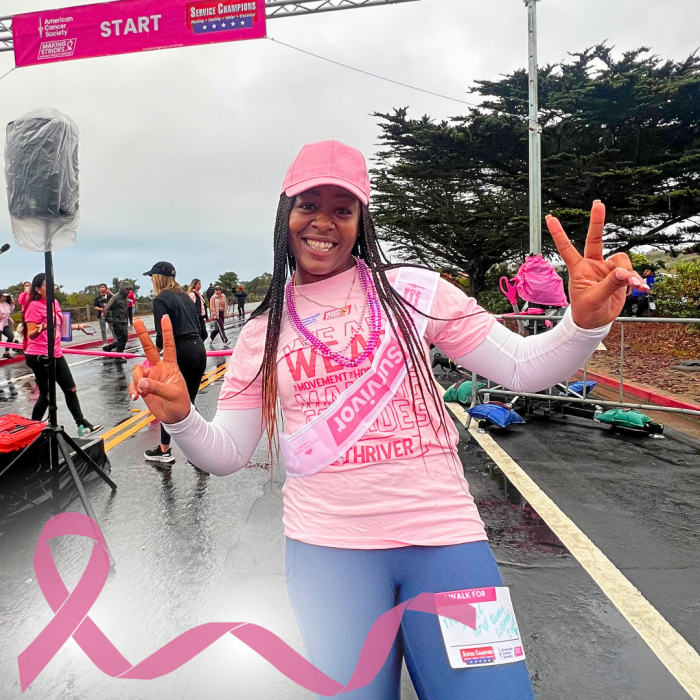
I am Jennifer Johnson, and this is my story.
I was 38 years old and in the best shape of my life. As an avid hiker, runner, and fitness instructor, I had built a lifestyle around health and wellness, so when I was diagnosed with triple-negative breast cancer, I was stunned. With no family history of breast cancer, I never expected that this disease could affect me. I felt invincible, constantly pushing my body to new limits, whether running marathons, leading fitness classes, or hiking new trails.
The day of my diagnosis, everything changed. I had gone in to see my doctor after finding a lump in my breast; I knew something wasn’t right. I advocated for a mammogram despite the recommended guidelines of waiting until 40 years old.
After getting scanned and then having the lump biopsied, I remember sitting in my doctor’s office completely blindsided. How could someone so focused on health and fitness have cancer? It didn’t make sense. That moment of disbelief quickly transformed into determination. I decided that, just like any other challenge I had faced, I would take this one head-on.
My daily routine shifted from teaching fitness classes to balancing chemotherapy
sessions, tracking medications, and still finding time to stay active in ways that my body would allow. Movement had always been a source of strength for me, and even on the
most challenging days, a walk in nature or a gentle yoga session would help me feel a bit more like myself.
What got me through this time was my commitment to staying active and the overwhelming support from my community. My friends, family, and fellow hikers rallied behind me. They reminded me that I wasn’t fighting alone. That encouragement and my passion for fitness became my anchors during the toughest parts of treatment.
If I could offer one piece of advice to others facing a similar diagnosis, it’s to find what makes you feel strong and hold onto it. Whether it’s fitness, art, or time with loved ones, having something to focus on outside of your diagnosis can make all the difference. Today, as a survivor, I continue to advocate for health and fitness, knowing that every step forward is a victory.
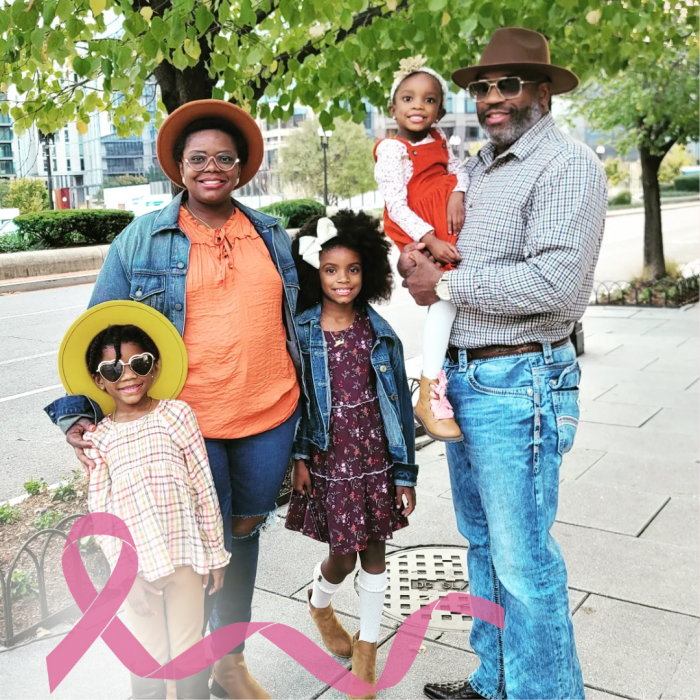
I am LaToya Bolds-Johnson, and this is my story.
I had felt a lump in my left breast about a month before my diagnosis. I didn’t think there was any significance after discovering the lump. I had not long ago stopped breastfeeding my one-year-old baby girl at the time, and I just figured it was a residual breastfeeding milk cyst. A couple more weeks passed by, and I still felt a lump, so I set up a virtual appointment and was able to have a mammogram and sonogram scheduled.
Then, on July 26, 2021, while I was working in the emergency department on a 12-hour shift, I received the devastating news of a cancer diagnosis on my phone through a patient portal email alert. I looked at the report and read the pathology findings showing triple-negative breast cancer, grade 3.
It took me a long time to process that I was actually a cancer patient. How could this be? I am a licensed healthcare professional. I am the person who takes care of patients; how did the roles flip? That was the biggest part of it all for me to digest, and I felt vulnerable and weak.
After about 8 weeks of chemo, an epiphany came to me. I felt helpless but wanted to do something to still help patients during my cancer treatment journey. The healthcare provider was still alive within me, and I needed to do something to make me feel fulfilled in some way. I decided to start posting videos about my diagnosis in hopes that it would reach another woman who looks like me and is the same age.
I felt people needed to know they should not wait until their 40th birthday for a mammogram. Get a mammogram now! Early detection saves lives. No one pushed this health recommendation to me, and even through my PA college education, I was always taught mammograms don’t start until age 40. Well, the recommendations and those schoolbooks were wrong.
My advice to others navigating breast cancer: Don’t forget to fight and count your blessings because you are blessed, my lovelies. Lose yourself in helping others feel better, and always be kind to yourselves. Remember, cancer is not just a physical diagnosis. It also affects your mental, emotional, spiritual, and financial state. It also affects your loved ones, and as a cancer thriver, you definitely need a support system and mental health treatment, too. I have good and bad days, but I’ve dedicated myself to helping to eradicate breast cancer and decrease the higher mortality associated with Black Breast Cancer. I owe this new mission in my life to my three daughters, whom I pray will never have to experience what I am going through in this journey of life.
The day of my diagnosis, everything changed. I had gone in to see my doctor after finding a lump in my breast; I knew something wasn’t right. I advocated for a mammogram despite the recommended guidelines of waiting until 40 years old.
After getting scanned and then having the lump biopsied, I remember sitting in my doctor’s office completely blindsided. How could someone so focused on health and fitness have cancer? It didn’t make sense. That moment of disbelief quickly transformed into determination. I decided that, just like any other challenge I had faced, I would take this one head-on.
My daily routine shifted from teaching fitness classes to balancing chemotherapy
sessions, tracking medications, and still finding time to stay active in ways that my body would allow. Movement had always been a source of strength for me, and even on the
most challenging days, a walk in nature or a gentle yoga session would help me feel a bit more like myself.
What got me through this time was my commitment to staying active and the overwhelming support from my community. My friends, family, and fellow hikers rallied behind me. They reminded me that I wasn’t fighting alone. That encouragement and my passion for fitness became my anchors during the toughest parts of treatment.
If I could offer one piece of advice to others facing a similar diagnosis, it’s to find what makes you feel strong and hold onto it. Whether it’s fitness, art, or time with loved ones, having something to focus on outside of your diagnosis can make all the difference. Today, as a survivor, I continue to advocate for health and fitness, knowing that every step forward is a victory.
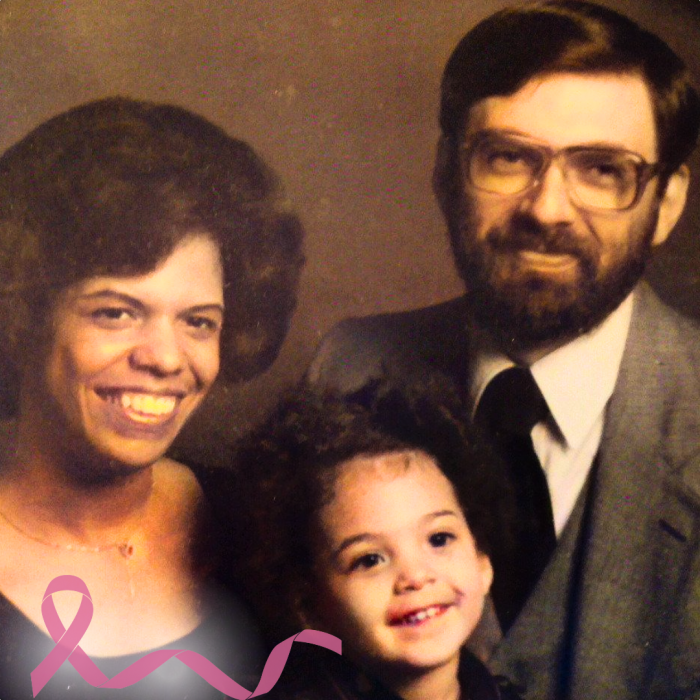
I am Michelle Gordon, and this is my story.
In the early 90s, I loved dancing and music and all the things 11-year-olds do. I was a typical kid except for one thing: my mother had breast cancer. My mother was the first in the family that we know of to be diagnosed with breast cancer. One of my memories of that time is telling my parents that I wanted them to be honest with me about the results and any news.
I remember how scared I was when the doctors officially diagnosed her with breast cancer, but I also remember how grateful I was that my parents were honest with me about what was going on with my mother’s health. They gave me updates and explained the results, even when it wasn’t good news.
They also made sure that I saw a therapist. Seeing a therapist helped me talk about my worries without feeling like I was burdening my parents while they were dealing with my mom’s diagnosis, surgery, and treatment too.
Due to my mother’s diagnosis of breast cancer, my doctor recommended that I get screened earlier. So, while most women don’t get screened until they turn 40, I started getting screened a lot earlier than that—about 10 to 15 years earlier. A few of my scans have required biopsies to investigate unusual masses, but I’m so grateful that I’m consistent with getting screened, as screening and early detection can save lives.
The best advice I can give is to find a way to be as open as possible with your child in an age-appropriate way so that they won’t feel so in the dark about what’s going on. And if you’re able, see if your child would benefit from talking to a therapist. It really can help them process it all.
Then, on July 26, 2021, while I was working in the emergency department on a 12-hour shift, I received the devastating news of a cancer diagnosis on my phone through a patient portal email alert. I looked at the report and read the pathology findings showing triple-negative breast cancer, grade 3.
It took me a long time to process that I was actually a cancer patient. How could this be? I am a licensed healthcare professional. I am the person who takes care of patients; how did the roles flip? That was the biggest part of it all for me to digest, and I felt vulnerable and weak.
After about 8 weeks of chemo, an epiphany came to me. I felt helpless but wanted to do something to still help patients during my cancer treatment journey. The healthcare provider was still alive within me, and I needed to do something to make me feel fulfilled in some way. I decided to start posting videos about my diagnosis in hopes that it would reach another woman who looks like me and is the same age.
I felt people needed to know they should not wait until their 40th birthday for a mammogram. Get a mammogram now! Early detection saves lives. No one pushed this health recommendation to me, and even through my PA college education, I was always taught mammograms don’t start until age 40. Well, the recommendations and those schoolbooks were wrong.
My advice to others navigating breast cancer: Don’t forget to fight and count your blessings because you are blessed, my lovelies. Lose yourself in helping others feel better, and always be kind to yourselves. Remember, cancer is not just a physical diagnosis. It also affects your mental, emotional, spiritual, and financial state. It also affects your loved ones, and as a cancer thriver, you definitely need a support system and mental health treatment, too. I have good and bad days, but I’ve dedicated myself to helping to eradicate breast cancer and decrease the higher mortality associated with Black Breast Cancer. I owe this new mission in my life to my three daughters, whom I pray will never have to experience what I am going through in this journey of life.
The day of my diagnosis, everything changed. I had gone in to see my doctor after finding a lump in my breast; I knew something wasn’t right. I advocated for a mammogram despite the recommended guidelines of waiting until 40 years old.
After getting scanned and then having the lump biopsied, I remember sitting in my doctor’s office completely blindsided. How could someone so focused on health and fitness have cancer? It didn’t make sense. That moment of disbelief quickly transformed into determination. I decided that, just like any other challenge I had faced, I would take this one head-on.
My daily routine shifted from teaching fitness classes to balancing chemotherapy
sessions, tracking medications, and still finding time to stay active in ways that my body would allow. Movement had always been a source of strength for me, and even on the
most challenging days, a walk in nature or a gentle yoga session would help me feel a bit more like myself.
What got me through this time was my commitment to staying active and the overwhelming support from my community. My friends, family, and fellow hikers rallied behind me. They reminded me that I wasn’t fighting alone. That encouragement and my passion for fitness became my anchors during the toughest parts of treatment.
If I could offer one piece of advice to others facing a similar diagnosis, it’s to find what makes you feel strong and hold onto it. Whether it’s fitness, art, or time with loved ones, having something to focus on outside of your diagnosis can make all the difference. Today, as a survivor, I continue to advocate for health and fitness, knowing that every step forward is a victory.

